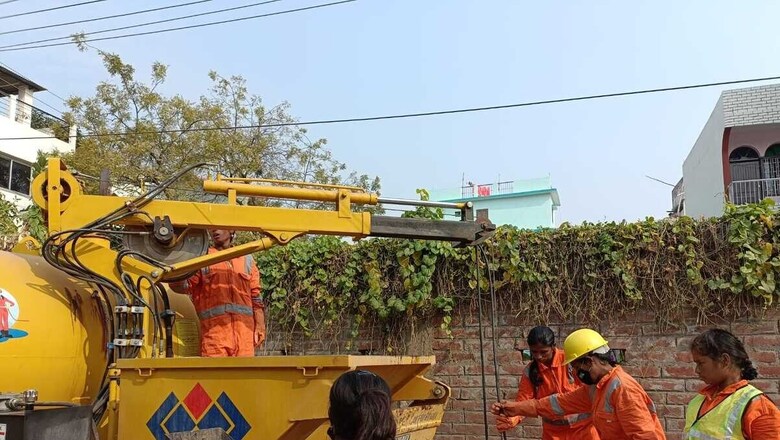
views
In the bustling streets and hidden alleys of India’s towns and cities, there exists a cadre of unsung heroes – women sanitation workers. These remarkable individuals work tirelessly to ensure our neighbourhoods stay clean and our communities remain healthy. They are the change-makers, the silent revolutionaries, and the driving force behind India’s sanitation transformation.
As India’s leading brand in the lavatory care segment, Harpic has a deep and nuanced understanding of the challenges that women sanitation workers face. It channelled this understanding into the creation of Harpic World Toilet College (HWTC) in 2016.
HWTC was established with the stated objective of improving the quality of life of sanitation workers through their rehabilitation by linking them with dignified livelihood options. Workers trained by the college are provided placement with various organisations. Following the successful proof of concept in Rishikesh, HWTCs have opened in Maharashtra, Aurangabad, in partnership with Harpic, Jagran Pehel and Maharashtra Government.
For Harpic, the work that began with HWTC took on more breadth with Mission Swachhta aur Paani. Harpic joined hands with News18 in Mission Swachhta aur Paani, a movement that champions the cause of inclusive sanitation, equality for all genders, abilities, castes and classes and the strong belief that clean toilets are a shared responsibility.
For 3 years now, Mission Swachhta aur Paani has brought together the right stakeholders on a common platform, so that issues of importance can be discussed, and solutions found. These stakeholders include govt officials, municipalities, NGOs, activists, grassroots organisations and of course, sanitation workers.
Mission Swachhta aur Paani also functions as a repository for information on a vast variety of topics surrounding toilet access, toilet hygiene, and both the work sanitation workers do, and the challenges they face.
Women sanitation workers in India are not just cleaning our streets; they are changing the narrative of sanitation. Their achievements, both personally and professionally, are nothing short of remarkable. They are the embodiment of change-makers, challenging stereotypes, empowering communities, advocating for health and hygiene, and inspiring future generations. Let’s explore how initiatives like HWTC and Mission Swachhta aur Paani are recognizing, supporting and championing the efforts of women sanitation workers.
Breaking Stereotypes and Paving the Way
In a society often bound by stereotypes and gender norms, women sanitation workers are breaking the mould. They are challenging the perception that certain jobs are reserved for men and proving that women can excel in any field they choose. These women have shattered the glass ceiling, and in doing so, they’ve paved the way for future generations of women to pursue careers that were once considered unconventional.
Take, for instance, the story of Sushila Sable, a sanitation worker in Mumbai, Maharashtra. From a young age, Sushila worked alongside her mother as a waste picker. However, she didn’t stop there. With determination and resilience, she formed self-help groups (SHGs) and used her leadership skills to educate others about proper waste segregation. Today, she is not only an environmental leader but also a role model for her community. Her journey exemplifies the spirit of change-makers, who rise above societal expectations to create a brighter future.
Empowerment Through Education
Education has been a potent tool for women sanitation workers to transform their lives. Many of these women have pursued education alongside their sanitation jobs, breaking free from the cycle of illiteracy that often plagues marginalised communities. Organisations like HWTC have played a pivotal role in providing them with the necessary skills and knowledge to excel in their profession.
For instance, Usha Chaumar, a Padma Shri awardee from Alwar, Rajasthan, was once trapped in the dehumanising practice of unprotected sewer work. With the intervention of organisations like Sulabh International, she not only broke free from this potentially hazardous occupation but also received training in various trades. This empowered her to uplift other women from similar backgrounds, demonstrating the transformative power of education.
Champions of Change in Their Communities
Beyond their immediate responsibilities, women sanitation workers are champions of change within their communities. They actively engage in awareness campaigns, advocating for better sanitation practices and improved hygiene standards. Their influence extends far beyond their daily duties, as they inspire others to take pride in their surroundings and uphold cleanliness.
Maya Sable, a sanitation worker from Pune, Maharashtra, epitomises this spirit of community leadership. She not only maintains cleanliness but also actively participates in programs aimed at educating children about hygiene. Through her actions, she demonstrates that sanitation work is not just a job; it’s a commitment to community well-being.
Economic Empowerment and Dignity
One of the most remarkable achievements of women sanitation workers is the economic empowerment they have gained through their work. With a stable source of income, they are breaking free from the shackles of poverty that often hold marginalised communities back. This newfound financial independence empowers them to provide for their families and offer their children better opportunities.
For instance, Archana Sonavane’s conservative family prohibited her from leaving her home for proper employment or training. HWTC’s digital program offered her an easy way to sidestep her family’s objections to training. This training then led to a job in the organised sector, with benefits. Archana’s decision has not only transformed her own life but also her family’s fortunes. During the pandemic, she provided for her family while her husband lost his job, earning both their respect, and a sense of independence.
Supporting Mental and Emotional Health
In addition to physical well-being, women sanitation workers are also paying attention to their mental and emotional health. They recognize the importance of self-care and emotional resilience, especially in a profession that can be physically demanding and emotionally challenging.
Hansaben Maheshbhai Makwana, who hails from the Valmiki community in Gujarat, exemplifies this focus on holistic well-being. Despite the societal stigma associated with sanitation work, she pursued her dream of becoming a beautician. Her story highlights the importance of pursuing one’s passions and maintaining mental and emotional health alongside professional growth.
Conclusion
As we celebrate these incredible women and their accomplishments, let us also recognize the importance of the work these many grassroots organisations and NGOs are doing to support and uplift sanitation workers across the country. Without their interventions, many of these stories wouldn’t have the space or opportunity to be.
Women sanitation workers, and the work they do is essential for our health, our communities, and our nation. These are the women who keep our cities clean and our children healthy. And it is time we returned the favour.
Join us here, to do your part in creating a fairer, more equitable, more compassionate, Swasth and Swachh Bharat.




















Comments
0 comment